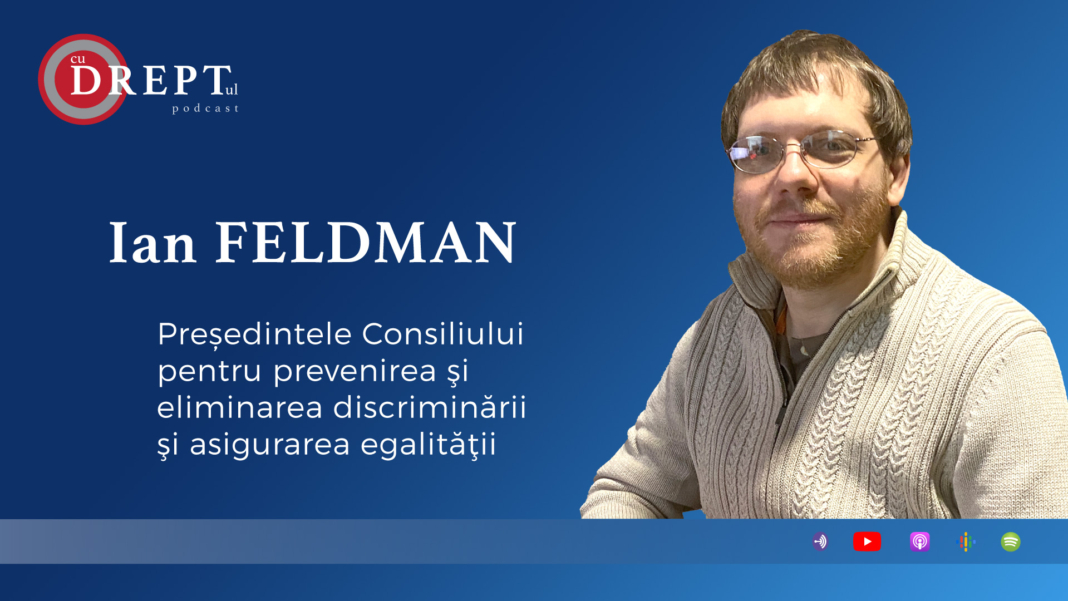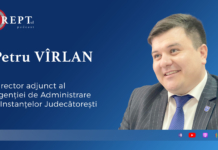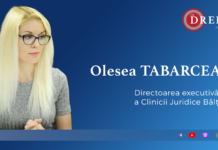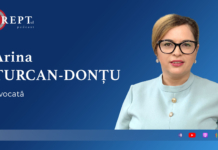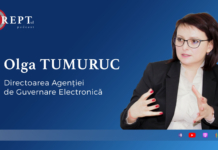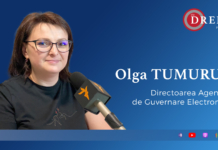The guest of this episode is Yan Feldman, the President of the Council for Preventing and Eliminating Discrimination and Ensuring Equality. The Council was created 9 years ago and its mission is to prevent and protect against discrimination, to ensure equality, promote equal opportunities and diversity in order to develop an inclusive society, where people enjoy their rights and freedoms regardless of individual particularities.
But actually, what does the Council and its team do in practice? It examines whether and how the legislation meets the requirements for non-discrimination, monitors how it is implemented, examines complaints, reinstates victims of discrimination and informs the society with a view to eliminating all forms of discrimination.
Ian Feldman explains how widespread discrimination is in Moldova and which categories of people are most affected, how a person who is discriminated or who notices such a situation can act, but also what impact did the pandemic from the last two years had.
Ian Feldman: We know that 87 per cent of Moldovans say that they faced discrimination in the last year or believe that discrimination exists in the Republic of Moldova. It is a pretty high percentage, not necessarily everyone who says they have been discriminated against knows what discrimination means and here the council is still working towards that. The fact is that discrimination is a fairly widespread phenomenon in the Republic of Moldova, and the number of complaints addressed annually to the Council has increased. The most discriminated groups are people with disabilities, discrimination on grounds of disability, discrimination on grounds of sex/gender, women are predominantly discriminated against and discrimination on grounds of language/ethnicity. Sometimes age, state of health along with disability are also grounds for discrimination.
Usually, when something changes in the legislation on retirement, we get a wave of complaints related to it, but disability, sex/gender, language/ethnicity are in top 3 in the Republic of Moldova.
Cu DREPTul: Hence, this is based on the cases examined by the Council. Other than that, how do people in the society perceive discrimination? Can the situation be different?
Ian Feldman: Every two years we make a study, where we measure the social distance, the distance to different vulnerable groups. For instance, we see that the greatest social distance in the Republic of Moldova was toward the people from the LGBT+ community, a wide social distance toward the people living with HIV, a rather wide social distance toward former detainees, but these groups are not covered in the Council’s decisions. Why? Because people are hiding their status or their situation, they’re afraid to address it, they’re actually afraid to defend their rights, and that tells us something. Indeed, our statistics reflect only what is happening at the Council, but the country statistics, which we can see only through the research, sociological studies, are a little bit different.
Cu DREPTul: What were the effects of the pandemic on this area?
Ian Feldman: Not to mention the fact that there are situations of discrimination directly related to the pandemic situation, where the Council ruled, for example, the burial of persons deceased due to COVID in separate places at cemeteries, which was an excess and an exaggeration and the Council said it was discrimination, or, for example, the fact that relatives cannot say goodbye to a deceased person in conditions of dignity, that is, when lifeless bodies were handed over in bags, in bags, without the possibility of saying goodbye, was not foreseen by any regulation neither at the global level, nor at the European level, nor at the level of the Republic of Moldova and the Council ruled that it was discrimination. That’s one side of it, but if we talk about the general situation of rights or, for example, limitations of rights, wearing of mask, where the Council, of course, more than once declared that the requirements related to the protection of the population do not represent discrimination. In the epidemiological situation we have had several addresses and several times we have ruled on this situation. This is about the pandemic.
If we talk about human rights in general, we can see that the poor have become even poorer, and the rich have become even richer. And this is the main problem and as usual the most vulnerable groups have been affected.
I give you a very simple example: apparently neutral, who did the transition to online education affect the most? Poor people from the socially vulnerable families. They don’t have a computer at home or a high-performance phone to connect to lessons. And, for example, we saw and found out that Roma people are more affected by discrimination on the basis of ethnicity. If you have more children and more limited living space, it is still not clear how a child from the ninth grade and another from the first grade can make lessons in the same room, especially since mom and dad also have to work remotely, for example. A provision that disproportionately affected the poorest is the indirect discrimination on different grounds.
We have to be vigilant because I keep repeating, it is kind of my motto: rights exist where they are defended. No one will defend your rights for you, you must be the one who promotes and defends your rights, rights exist then and where they are used and defended very vocally.
Cu DREPTul: What should happen when a person is discriminated? What is the reinstatement procedure?
Ian Feldman: First, the Council’s website egalitate.md guides you what to do, how the complaint is reviewed and you can even file it online. If you felt discriminated, open the site, the easiest way – read Petitioner’s Guide how to file a complaint and you can file it online. There is a button called ”File a complaint online” and the complaint can be filed online. If not online, by e-mail, if you do not want by e-mail, you can send it by mail.
Cu DREPTul: Is the Council the only way to establish discrimination, examine and reinstate in rights? If not, what are the others?
Ian Feldman: First of all, the Council is an independent national institution for human rights protection designed to provide an easier and simpler way to defend human rights. If the person has money and is in the mood, he/she can go to court, this is the main, fundamental way – the justice. The first attempt to remedy the situation is to talk to the person then to address to the immediate leader, after which, if you see that it does not work and you cannot remedy the situation, there are two ways, at the Council, which examines easier, faster, but whose decisions, although binding, can be challenged in court, which issues the final decision.
Cu DREPTul: You have been part of the Council since it was founded almost 10 years ago, what are the main challenges and successes?
First of all, we created a truly independent institution, an institution that brought to light the most pressing problems of the society and made decisions on the most complicated cases – the penitentiary system, people with disabilities, discrimination on grounds of gender, discrimination on grounds of language, religion.
Ian Feldman: We have become a well-known institution in the European region, in 2018 the Council was accepted as a member of Equinet, the Network of Equality Institutions in the European Union. This network meant to have only states of the European Union as members, but due to the work we have done, the Equinet decided to change its status to accept the Republic of Moldova, so in our area, we are full-fledged members of the European Union. I vote at conferences together with other countries of the European Union. It’s a kind of gratitude for the efforts we’ve made to create this independent institution for the protection of human rights. If we talk about the situation in the Republic of Moldova, we have an increase in the number of complaints every year, more and more people are lodging them. Does this mean that more and more people are discriminated in Moldova? Not quite. I think it’s more about the fact that the Council is getting better known and more and more people are finding out about such an institution and that you can go to the Council and get an effective remedy. Disadvantages – sometimes our interaction with courts becomes more complicated, our decisions have started to be canceled on formal grounds more often than before, and this fact worries me quite a lot.
Cu DREPTul: Give us an example what do these formal reasons entail?
Ian Feldman: Formal reasons refer to when was the letter sent, to whom it was addressed, how many days ago. Yes, when we talk about a super-formal thing, this approach can take place, but we are talking about an institution for the protection of human rights, we are talking about complicated cases, we are talking about the law that was passed, as you said, almost 10 years ago, having no understanding of how this Council would work, and there is a practice now.
Cu DREPTul: What should happen in Moldova so that things change not per case filed, case solved, but in general, in the society?
Ian Feldman: Everything is changing gradually and we are not even in the worst or most complicated situation. On almost every area of discrimination, I can show you a country in the European Union, where the situation is worse than in the Republic of Moldova, so we rank last in discriminating against certain vulnerable groups, but it is not so bad on overall.
The situation changes only through education and the protection of rights, because sometimes you can’t even know that there is a problem before someone faces the problem and address the Council to highlight it.
Not even those who write the laws, for example, we often say that this provision is contrary to the standards in discrimination, but those who write the laws could not imagine that this situation would arise, this is why the mechanism of feedback from the population exists. Hence, effective and efficient education, promotion and protection of rights.
Cu DREPTul: Would you describe one or two cases when the Council’s decisions had great resonance or impact?
Ian Feldman: If we talk about the impact of a small decision of the Council on many-many people, then every person with severe disability has the right to a personal assistant, and when the Regulation on Personal Assistant Service was voted the first time, it contained a provision that a pensioner cannot become a personal assistant. This provision affects thousands of people, especially people with disabled children who care for these children all their lives. The Council found that this was discrimination and this provision was changed and, for instance, this small decision that few know about changed the lives of several people or, for example, people with locomotor impairments, within the implementation of the Council decision, were given the opportunity to import a duty-free special vehicle, which is adapted, rebuilt for the needs of people with locomotor impairments had a great impact on many people, on thousands of people in the Republic of Moldova.
Cu DREPTul: What is the relation with state institutions? That you have to sanction them, too.
Ian Feldman: The Ombudsman and us are both two independent state institutions under Parliamentary control and once the structure of the Council was voted and elected, the Council must operate under conditions of absolute independence, just like the Ombudsman. And of course, we also rule against state institutions. We had situations when most of the Council’s decisions were challenged by other state institutions, but first of all, we have won a lot of decisions, and secondly, we built our image, our authority and the situation is not that serious now – the state institutions do not challenge often our decisions and, for instance, in the situations I described earlier, the Council’s decisions were executed, implemented willingly by the Government or the Ministry of Finance, let’s say, not immediately, but they agreed to propose 1, 2, 3, 4…in the new budget year. These are our relations with state institutions.
Cu DREPTul: Priorities?
Ian Feldman: Our priority for now is communication. The key priority is to amend or improve the legislation in the field, to promote and streamline the examination of complaints. In collaboration with the Council of Europe, we drafted a Strategy for Monitoring Council’s Decisions. If and when we amend the legislation, we will have the right to appeal to the Constitutional Court, this will also be a new trend for us; if we see any provision that we believe is contrary to the Constitution, we will be able to address to the Constitutional Court and this address will be examined. These are our priorities or plans generally speaking, and of course, to work as efficiently as possible with the few resources we have.
Cu DREPTul: How has the discrimination changed since 2013?
Ian Feldman: The world has become more alert, it understands better what discrimination is, it knows better how to defend its rights; of course, the situation has changed, and I think this situation has changed in a good way, but it has to be even better.
Cu DREPTul: What about the categories of people who are discriminated?
Ian Feldman: The history is a bit longer or more complicated, because every time something changes or, I’ll give you an example, when this reform started with the introduction of the new Education Code and several high school and new school principals were dismissed, we had a number of complaints and in this sense we can say that we are kind of a barometer of the situation in the society. Is it good or bad? I think it is good, because we react to real needs and situations and I do not think there is a country or a situation when you can say that there is no more discrimination.
This material was developed as part of the “Strengthening Efficiency and Access to Justice in Moldova” Project, implemented by the UNDP Moldova, with the financial support of Sweden. The views are those of the authors and do not necessarily reflect the views of UNDP and Sweden.
This text is an excerpt from the CuDREPTul podcast. The full version, audio and text, exists only in Romanian.


